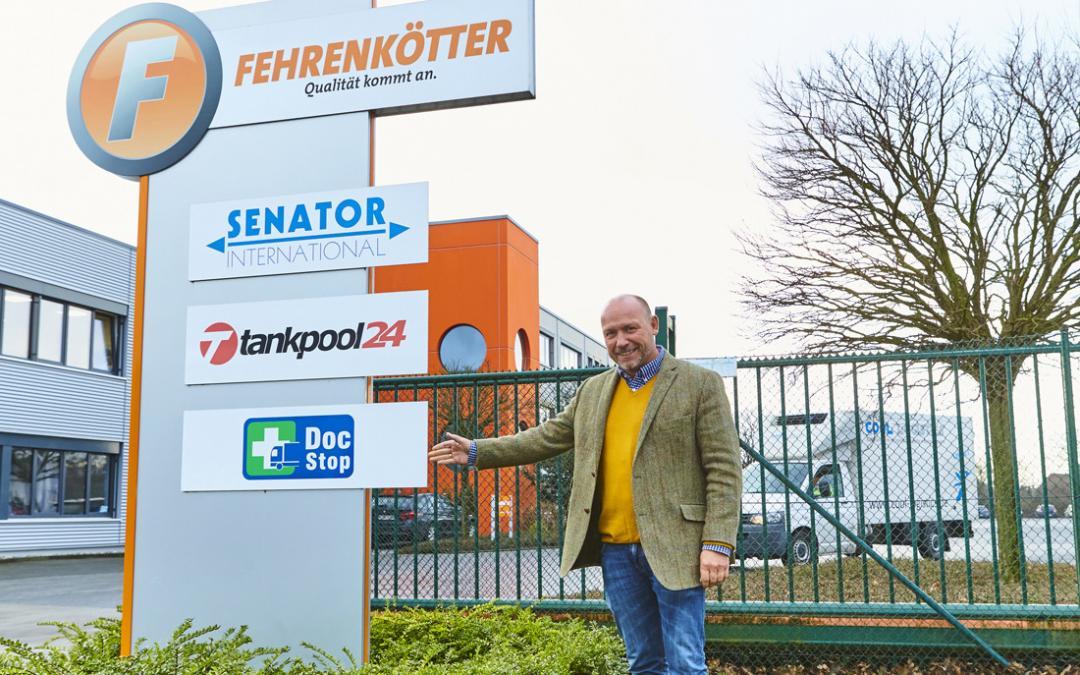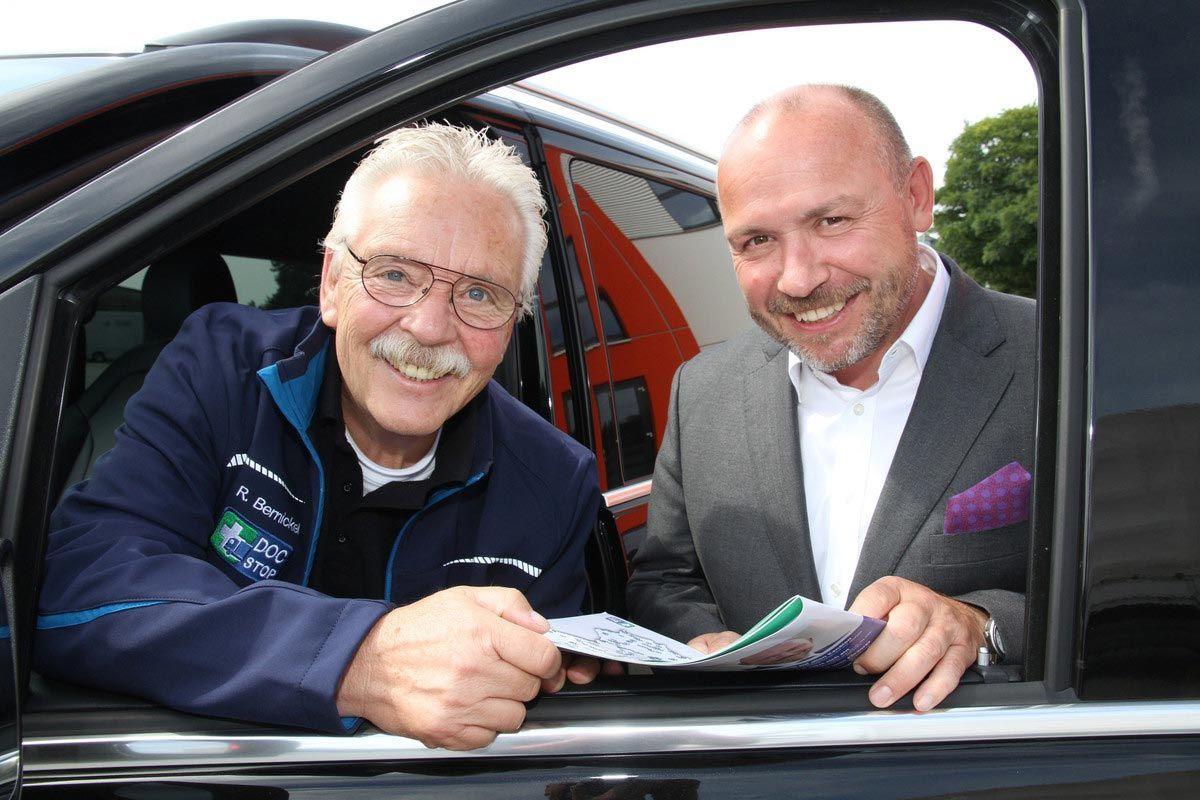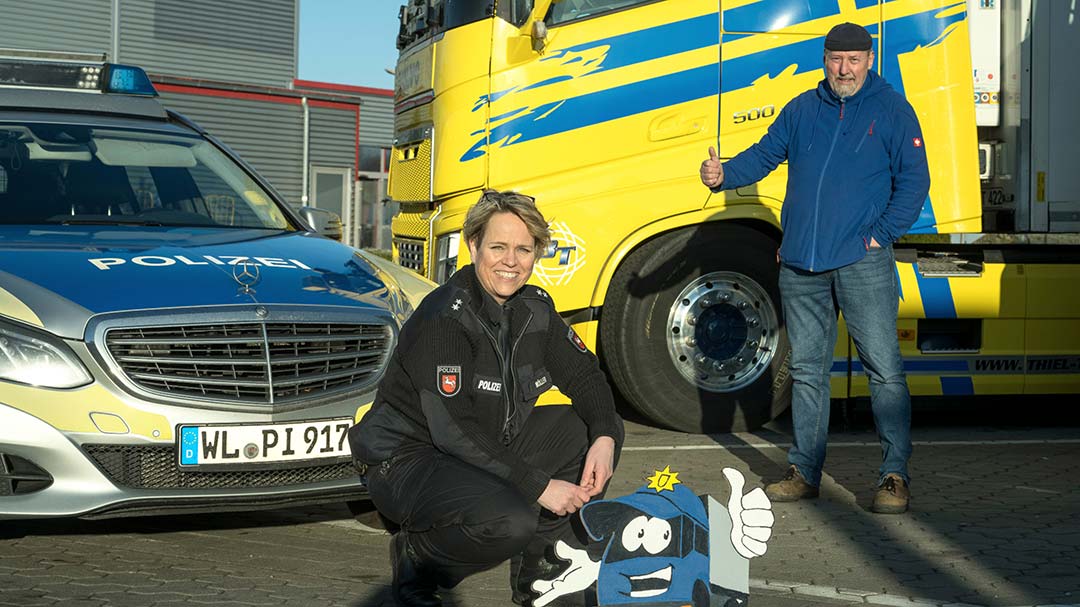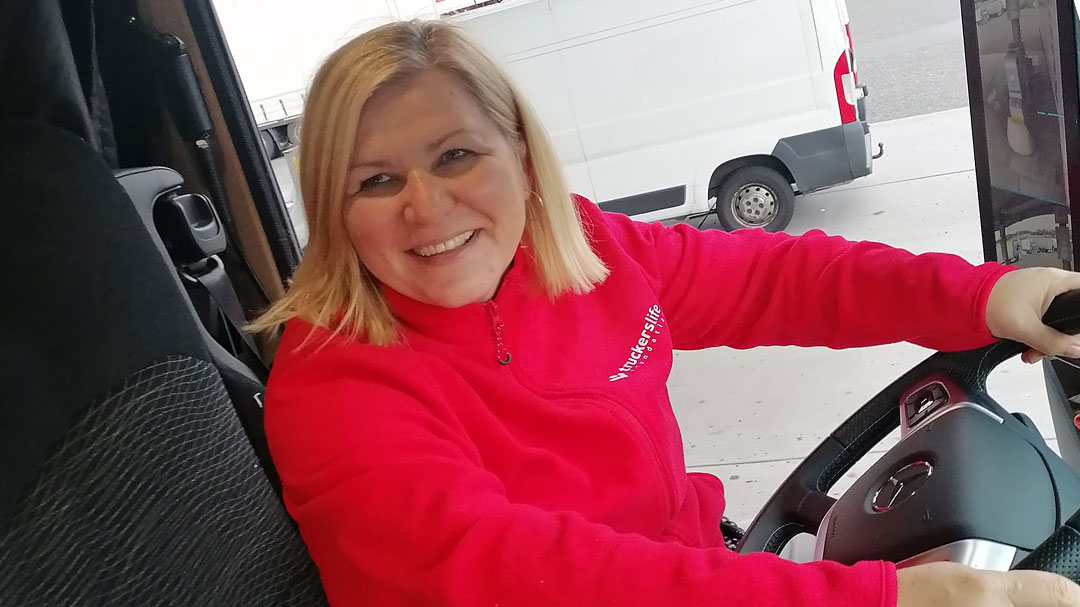Reading time approx. 4 minutes
Text: Peter Büttner
Photos: Rudi Schubert
Professional truck drivers who need medical assistance during a journey often do not know how to find a doctor near them who can treat them at short notice. And where can they park their 40-tonne truck during the visit? The DocStop initiative has created a network that provides truck drivers with quick and straightforward help in such situations.
Joachim Fehrenkötter remembers it like it was yesterday: as a student, he was once delivering goods to the Eifel for his parents’ haulage firm when he suddenly came down with the flu. It became hard for him to unload the cargo; his limbs suddenly ached and he began to sweat. But he gritted his teeth together, got behind the wheel again and drove the 300 kilometres back to Münsterland. Today the 51-year-old knows that wasn’t a good idea: ‘Only a healthy driver is a safe driver,’ explains the haulier. It would have certainly been a good idea for him to stop working immediately and go find a doctor. But finding one on the road and arranging an appointment is anything but easy for a professional driver who, far away from home, usually don’t know where the nearest doctor’s office is when they feel ill. There also isn’t always suitable parking nearby for a 40-tonne truck. And long waits at the doctor’s office are difficult for a truck or bus driver to fit into their tight schedule.
The DocStop initiative helps in precisely such situations. Over the past ten years, the association has grown a network of more than 700 doctors, dentists and clinics that treat truck drivers at short notice in the event of illness. The network, which, alongside Germany, has primarily developed in Denmark, Austria and Switzerland also includes service stations, car parks and haulage companies where drivers can park their vehicles safely during a doctor’s appointment.



»In some cases, pain can affect driving ability far more than being intoxicated.«
Joachim Fehrenkötter
Joachim Fehrenkötter has long since taken over the haulage business from his father and is now himself responsible for around 180 professional drivers who drive the company’s 150 or so trucks. The haulier is one of DocStop’s early supporters and has been chairman of the initiative for several years. He knows from conversations with drivers that the offer is well received – even if he hopes that nobody will have to make use of it. But it’s always possible that someone on the road might suddenly be stricken with a cold, back pain or a toothache. ‘We’re not talking about real emergencies,’ he says. But the focus is on illnesses that can still have a major impact on drivers: ‘Pain can greatly impair driving ability – in some cases, the risks associated with it are even far greater than those associated with driving under the influence of alcohol.’ That is why Fehrenkötter and his fellow members of the initiative want to lower professional drivers’ inhibitions about seeking medical help – and thus prevent drivers from continuing to drive with physical discomfort or medicating themselves until they arrive back home. ‘We have a duty to take care of them,’ Fehrenkötter says.
DocStop indicates nearest doctor’s office
If a driver becomes ill, he can find out where the nearest doctor’s office is on his route by calling one number that is valid throughout Europe. The doctors and hospitals in the network communicate in all common European languages. Their locations and contact details are also listed on the DocStop website and in the ‘Fernfahrer’ and ‘Autohof’ apps. The response has been overwhelming: around 5,000 truck drivers a year use the service and seek out medical assistance. The team behind DocStop consists entirely of volunteers, and the service is free of charge for drivers. The doctors who support DocStop have agreed to provide treatment at short notice. ‘Some of them used to drive trucks themselves and are part of the network because they support the idea behind it,’ Fehrenkötter knows. As usual, the physicians settle the treatment costs directly with the driver’s health insurance, via a foreign health insurance certificate or by cash payment.
DocStop initiator Rainer Bernickel (left) and association chairman Joachim Fehrenkötter are committed to ensuring that professional drivers receive rapid medical assistance on the road.
Initiative launched by motorway policeman
The founder and volunteer ‘motor’ behind DocStop is Rainer Bernickel, who served as chief inspector and traffic safety consultant for the Münster motorway police until 2007. In the year 2000, he started a regular get-together for police officers and truck drivers, where they could talk about their everyday lives and listen to each other – the goal was cooperation instead of confrontation. This initial group from the Münster motorway service area has now become an almost nationwide institution. The association, which is now in its 12th year, worked hard to build the network, and it now covers almost all of Germany, Fehrenkötter reports. Coverage is especially good on the major transit routes, but it is getting worse off the busy routes. In Austria, DocStop cooperates with the service provider ‘Service 24’, which provides around 50 doctors for drivers in the Alpine republic. The system is also being established in Denmark, France and the Netherlands. ‘Every country needs a Bernickel,’ jokes Fehrenkötter. DocStop currently has around 30 regular supporters from the freight forwarding and commercial vehicle industries.
»Companies have given quite a lot of thought to technology, but not so much to health.«
Joachim Fehrenkötter
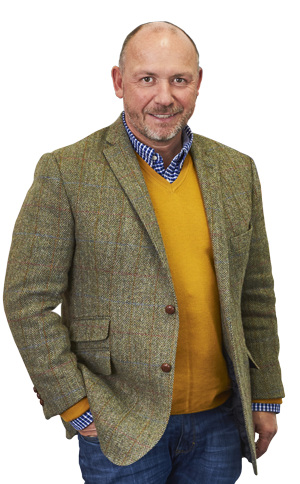
»Companies have given quite a lot of thought to technology, but not so much to health.«
Joachim Fehrenkötter
Not only can a commitment to drivers’ health make the profession more attractive, but obviously also plays a role financially: ‘If a driver suddenly falls ill in Munich, for example, someone else has to go there who can then continue the journey,’ reports Fehrenkötter. That’s why he’s pushing for a change of perspective in the industry: ‘Companies have given quite a lot of thought to technology, but not so much to health.’ The businessman has therefore also included nutrition as a topic in his driver training courses. This is because drivers’ ability to take care of their health during their journeys has improved, with service stations and truck stops today usually also offering healthy food. And vehicle manufacturers are also getting involved: Daimler and the German Sport University Cologne have developed a fitness device that drivers can use in their cabs during breaks. The ‘Top-Fit-Set’ consists of a board made of wood and exercise straps with different resistances, which can particularly be used to strengthen and relieve the back. Training videos show how to exercise with it. Fehrenkötter is very impressed with the effects, which are also backed up by science: ‘One of our drivers worked out with the device and changed his diet – and lost a total of 20 kilograms.“
Doctor’s offices wanted
In order to expand the network of medical professionals offering assistance to drivers on the road, the DocStop initiative is looking for additional clinics and other medical care facilities that are willing to treat truck drivers at short notice in the event of illness. You should meet the following requirements:

